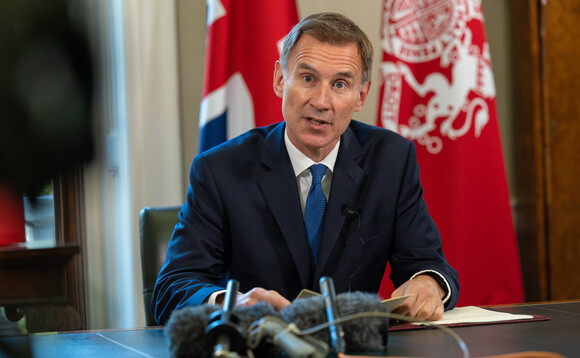Up to £75bn of investment from defined contribution (DC) and the Local Government Pension Scheme (LGPS) could be used to grow the economy and boost member outcomes, the UK chancellor has announced.
In last night's (10 July) Mansion House speech, chancellor Jeremy Hunt launched an array of reforms encompassing DC, the local government pensions, and defined benefit (DB) schemes, with the average saver expected to benefit from more than £1,000 extra a year in their pension pot.
He said the ‘Mansion House Reforms' could increase the average savers' pension pot by about £16,000, or 12%, with the aim of increasing investment in high-growth UK businesses as well as ensuring better member outcomes.
The reforms will include the chancellor's "three golden rules" of securing the best member outcomes, prioritising a "strong and diversified gilt market" and delivering an "evolutionary, rather than revolutionary change" in pensions, and strengthening the UK's position as a leading financial centre.
‘Unlocking' DC investment
An agreement between nine of the UK's largest DC pension providers - the so-called Mansion House Compact - will be a key part of the reforms, committing the providers to the objective of allocating 5% of assets in their default funds to unlisted equities by 2030.
Signatories of the investment compact include Aviva, Scottish Widows, Legal & General, Aegon, Phoenix, Nest, Smart Pension, M&G, and Mercer.
The chancellor said if all DC funds follow suit, up to £50bn could be allocated to "high growth" companies by 2030.
LGPS
As well as a potential £50bn influx of investment in high-growth companies, the reforms will also include a consultation on using the LGPS to boost investment.
The proposals include an ambition to double existing investments in private equity by to 10%, with the potential to "unlock" £25bn by 2030.
The consultation will also seek views on a potential March 2025 deadline for transferring all LGPS assets to pools, and "setting a direction" that these exceed £50bn of assets per pool.
VfM and DB superfunds
Also included in the reforms is a new value for money (VfM) framework, which the chancellor said will aim to prioritise long-term returns over just costs of running a scheme. Poorly-performing schemes - which the Treasury said can make members 46% worse off at retirement over a five-year period - will be "wound up into better-performing, larger schemes".
Additionally, a commitment to better manage the UK's 5,000 "fragmented" DB schemes will be soon announced by the government through the creation of a "permanent superfund regulatory regime", aiming to help sponsors and trustees better manage liabilities.
A call for evidence, set to launch today (11 July), will further seek views on how DB schemes and the Pension Protection Fund (PPF) can contribute to productive finance "whilst securing members' interests and protecting the sound functioning and effectiveness of the gilt market". A separate call for evidence on improving trustee skills and support across the pension industry will also be launched.
Hunt also said the government will encourage the creation of collective DC schemes, which the Treasury said are aptly placed to deliver effective investment through their pooled set up.
Effective investment
To speed up investment, the government will also collaborate with the British Business Bank to explore ways of introducing more investment vehicles, which will complement the £250m Long-Term Investment for Technology and Science (LIFTS) initiative announced in the Spring Budget.
Finally, the Mansion House reforms included an announcement that firm's prospectuses will be simplified to attract more investment, replacing "protectionist" rules inherited from the UK's membership in the European Union (EU) such as the share trading obligation and double volume cap. Additionally, more than 100 pieces of "unnecessary retained EU law for financial services" will be repealed in line with the 2023 Financial Services and Markets Act, which recently received Royal Assent.
Hunt said: "British pensioners should benefit from British business success. By unlocking investment, we will boost retirement income by over £1,000 a year for typical earner over the course of their career.
"This also means more investment in our most promising companies, driving growth in the UK."
Secretary of state for work and pensions Mel Stride added: "British workers should have the confidence that their pension savings are working as hard as they are. Our reforms will benefit savers and society - unlocking investment into pioneering UK businesses, growing the economy, and helping the record number of people in this country saving into a pension to achieve the retirement they want."
Lord Mayor Nicholas Lyons said: "These reforms and the Mansion House Compact mark a historic turning point that will accomplish the dual aim of securing a brighter future for retirees and channelling billions into our economy. I'm proud to have convened key industry players to make this commitment to unlock £50bn in capital by the end of the decade which will improve returns for pension savers and support firms to grow, stay and list in the UK."










